Skin tags, common growths in friction areas, are often removed for cosmetic reasons or irritation. While traditional methods like surgery and cryotherapy offer permanent removal with drawbacks, natural alternatives like apple cider vinegar (ACV) lack clinical evidence but are popular. ACV's exfoliating, antibacterial, and antifungal properties make it a gentle yet effective DIY option for Liverpool skin tag removal, though proper application techniques and safety precautions are crucial to avoid irritation or complications.
Looking for a natural way to remove skin tags near Liverpool? This guide explores the effectiveness of apple cider vinegar as a home remedy. We’ll first demystify skin tags, delving into their causes and typical appearance. Next, we’ll compare traditional removal methods, highlighting their pros and cons. Then, discover how apple cider vinegar can be a safe, natural alternative. Learn proven application techniques and essential safety precautions to consider before trying this at-home treatment for skin tags in Liverpool.
- Understanding Skin Tags: Causes and Appearance
- Traditional Methods for Removal: Pros and Cons
- Apple Cider Vinegar as a Natural Remedy
- Effective Application Techniques and Safety Precautions
Understanding Skin Tags: Causes and Appearance
Skin tags, also known as acrochordons, are small, soft skin growths that typically appear in areas where skin rubs against itself, such as the neck, armpits, and groin. They can vary in size, from just a few millimetres to over a centimetre, and often look like small tags or pieces of loose skin. While they are generally harmless, many people choose to remove them for cosmetic reasons or to avoid irritation caused by clothing or jewellery.
The exact cause of skin tags is not entirely understood, but it’s believed that they develop due to a combination of factors, including genetics, hormonal changes, and friction. In Liverpool Skin Tag Removal, individuals often seek safe and effective solutions to address these growths. Apple cider vinegar, with its potential antibacterial and antifungal properties, has gained attention as a home remedy for skin tag removal, though scientific evidence supporting its effectiveness is limited.
Traditional Methods for Removal: Pros and Cons
In Liverpool, as across the globe, skin tags have long been a common concern. Traditional methods for their removal range from surgical excision to cryotherapy, each with its own set of pros and cons. Surgical excision involves cutting off the tag with a scalpel, often requiring local anaesthesia, and while it offers permanent removal, it can leave scars and is more invasive. Cryotherapy, on the other hand, freezes the skin tags off using liquid nitrogen, minimizing scarring but potentially causing temporary pain and discomfort during treatment.
Alternatives like home remedies, including apple cider vinegar, have gained traction. Apple cider vinegar advocates claim it’s a safe, natural solution that can dissolve skin tags over time. However, its effectiveness is not backed by extensive clinical studies, and application methods vary widely. In comparison to established medical procedures, DIY methods are generally less expensive but may require more patience and could potentially lead to skin irritation or other complications if not done correctly. Thus, while traditional methods offer guaranteed results with minimal downtime, natural alternatives like apple cider vinegar remain a matter of personal preference and potential risk.
Apple Cider Vinegar as a Natural Remedy
Apple Cider Vinegar (ACV) has long been recognised for its diverse health and wellness benefits, including its potential as a natural remedy for various skin conditions. When it comes to Liverpool skin tag removal, ACV offers an intriguing alternative to conventional methods. This popular household ingredient is packed with malic acid, known for its exfoliating properties, which can help to soften and eventually eliminate skin tags.
Additionally, ACV’s antibacterial and antifungal properties make it a sought-after natural solution. By applying diluted ACV directly to the affected area, users may experience reduced inflammation and potential tag removal over time. Many people prefer this method due to its accessibility, affordability, and lack of harsh chemicals, making it an appealing option for those seeking gentle yet effective Liverpool skin tag removal solutions.
Effective Application Techniques and Safety Precautions
Effective Application Techniques: To employ apple cider vinegar for Liverpool skin tag removal, start by diluting it with water (a 50/50 mix is recommended) to reduce its potency. Soak a cotton ball in the solution and gently apply it to the skin tags using a circular motion. Leave the vinegar mixture on the affected areas for around 10-15 minutes before rinsing off with warm water. For best results, repeat this process daily until the skin tags fall off or shrink significantly.
Safety Precautions: While apple cider vinegar is generally considered safe, it’s essential to exercise caution. Test a small patch of skin first to ensure you don’t experience any adverse reactions like irritation or dryness. Due to its acidity, direct application can sometimes cause mild discomfort or stinging sensations, especially on sensitive areas. Always dilute the vinegar and avoid prolonged contact with intact skin. If used incorrectly, it could lead to skin damage. Consult a healthcare professional if you have concerns about using apple cider vinegar for skin tag removal, especially if you have underlying health conditions or take specific medications.
In light of the above, apple cider vinegar emerges as a promising natural alternative for Liverpool skin tag removal. Its acetic acid content helps soften the skin and potentially dissolves the connecting tissue of skin tags. However, it’s crucial to approach this method with caution, as individual results may vary. Always conduct a patch test before full application and consult a dermatologist if concerns arise. With proper technique and safety precautions, apple cider vinegar could offer a gentle, at-home solution for those seeking to remove skin tags.
